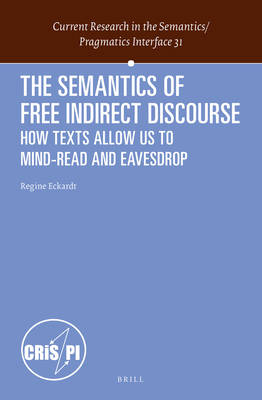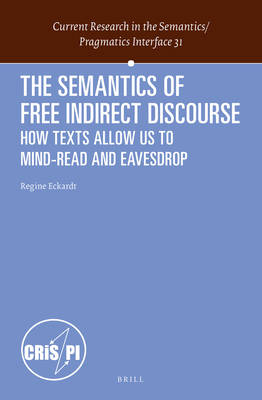
Bedankt voor het vertrouwen het afgelopen jaar! Om jou te bedanken bieden we GRATIS verzending (in België) aan op alles gedurende de hele maand januari.
- Afhalen na 1 uur in een winkel met voorraad
- Gratis thuislevering in België vanaf € 30
- Ruim aanbod met 7 miljoen producten
Bedankt voor het vertrouwen het afgelopen jaar! Om jou te bedanken bieden we GRATIS verzending (in België) aan op alles gedurende de hele maand januari.
- Afhalen na 1 uur in een winkel met voorraad
- Gratis thuislevering in België vanaf € 30
- Ruim aanbod met 7 miljoen producten
Zoeken
The Semantics of Free Indirect Discourse
How Texts Allow Us to Mind-Read and Eavesdrop
Regine Eckardt
€ 140,63
+ 281 punten
Omschrijving
Free indirect discourse presents us with the inner world of protagonists of a story. We seem to see the world through their eyes, and listen to their inner thoughts. The present study analyses the logic of free indirect discourse and offers a framework to represent multiple ways in which words betray the speaker's feelings and attitude. The theory covers tense, aspect, temporal indexicals, modal particles, exclamatives and other expressive elements and their dependence on shifting utterance contexts. It traces the subtle ways in which story texts can offer information about protagonists.
The study of free indirect discourse has been a topic of great interest in recent years in semantics and pragmatics. In this book, Regine Eckardt proposes a new theory of this domain and applies it to a wide variety of phenomena -- discourse particles, exclamatives, and mood -- in addition to the traditional indexical pronouns and tenses. She situates this project within a larger attempt to extend the tools of semantic analysis to fiction. Most formally oriented semanticists have not paid serious attention to this domain, which has resulted in a major gap in semantic theory; this book is thus a pioneering effort and raises many intriguing points. The total result is an empirically rich and exciting work which will be a profitable read for researchers interested in semantics, pragmatics, and formal approaches to literature. Eric McCready, Aoyama Gakuin University
The study of free indirect discourse has been a topic of great interest in recent years in semantics and pragmatics. In this book, Regine Eckardt proposes a new theory of this domain and applies it to a wide variety of phenomena -- discourse particles, exclamatives, and mood -- in addition to the traditional indexical pronouns and tenses. She situates this project within a larger attempt to extend the tools of semantic analysis to fiction. Most formally oriented semanticists have not paid serious attention to this domain, which has resulted in a major gap in semantic theory; this book is thus a pioneering effort and raises many intriguing points. The total result is an empirically rich and exciting work which will be a profitable read for researchers interested in semantics, pragmatics, and formal approaches to literature. Eric McCready, Aoyama Gakuin University
Specificaties
Betrokkenen
- Auteur(s):
- Uitgeverij:
Inhoud
- Aantal bladzijden:
- 296
- Taal:
- Engels
- Reeks:
- Reeksnummer:
- nr. 31
Eigenschappen
- Productcode (EAN):
- 9789004266728
- Verschijningsdatum:
- 28/11/2014
- Uitvoering:
- Hardcover
- Formaat:
- Genaaid
- Afmetingen:
- 160 mm x 239 mm
- Gewicht:
- 589 g

Alleen bij Standaard Boekhandel
+ 281 punten op je klantenkaart van Standaard Boekhandel
Beoordelingen
We publiceren alleen reviews die voldoen aan de voorwaarden voor reviews. Bekijk onze voorwaarden voor reviews.









